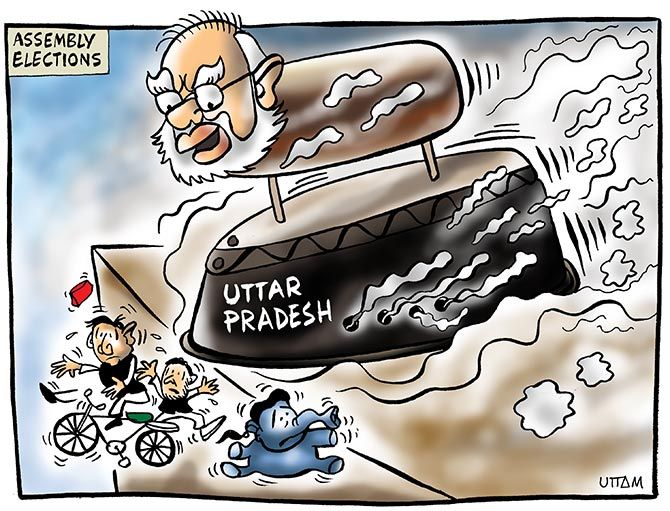Ministerial expansion: Focus on Purvanchal, Brahmin voters in UP.

Prime Minister Narendra Modi's ministerial reshuffle turned the spotlight on Purvanchal or eastern Uttar Pradesh and the Bharatiya Janata Party's efforts at balancing regions and caste equations, political leaders in Lucknow said.
Shiv Pratap Shukla's induction as a minister of state highlighted the importance of the Brahmin vote for the BJP, they said.
Shukla, who belongs to Gorakhpur, Chief Minister Yogi Adityanath's citadel -- joined the Union council of ministers just days after Mahendra Nath Pandey from Ghazipur, also in eastern UP, was made UP's BJP chief.
Shukla and Pandey are Brahmins, and the moves are being seen as efforts by the BJP to keep the community in its fold for the 2019 Lok Sabha election.
UP Deputy Chief Minister Dinesh Sharma is also a Brahmin.
"Brahmins are being given their due. The expansion is well thought out and balanced. This will strengthen the party for the 2019 Lok Sabha polls," a BJP insider said.
In a bid to also embrace western UP, Modi picked Satyapal Singh, a former Indian Police Service officer representing Baghpat in the Lok Sabha, as a minister of state.
Singh had trounced mighty Jat leader and Rashtriya Lok Dal supremo Ajit Singh, relegating him to the third spot in the west UP constituency in 2014.
Brahmins account for over 10 per cent of the electorate in UP and are considered a force to reckon with in the highly caste-based electoral politics in almost all its regions -- Bundelkhand, Rohilkhand, Purvanchal, Avadh and western UP.
Traditionally seen as Congress supporters, Brahmins started supporting the BJP in large numbers in the post-Mandal era. However, sections later also voted for Mayawati's Bahujan Samaj Party.
Perhaps keeping this factor in mind ahead of the 2019 Lok Sabha election, Pandey was picked up from eastern Uttar Pradesh bordering Bihar.
"Purvanchal (eastern UP) has once again been given importance in the ministry," BJP state spokesman Shalabh Mani Tripathi said.
Pandey, an MP from Chandauli, shot into prominence after his induction into the Union government in July 2016 just months before the assembly election in the state.
The slot has now been filled by Shukla with Pandey being handed over the mantle of party chief in UP, ahead of the parliamentary election less than two years away.
Similarly, Sanjeev Balyan's resignation from the Union ministry was filled by Satyapal Singh.
Balyan, a Jat, is from western UP as is the MP from Baghpat, who, like him, also belongs to the community that dominates the region.
Satyapal Singh, who wanted to be a scientist before he joined the IPS in 1980 and was given the Maharashtra cadre, had earlier said his 'inner voice' urged him to change his profession.
He quit the job of a police officer, became an MP and now as a Union minister aims at working "for the entire country with renewed energy".
The elevation of Mukhtar Abbas Naqvi, who belongs to Rampur in UP and is a member of the Rajya Sabha, to Cabinet rank sends a message to Muslims about the BJP's bid to take the community along, especially after its strong stand against the triple talaq, state BJP leaders said.
"The government has reposed faith in the minorities," UP Minority Affairs Minister Mohsin Raza said.
Illustration: Uttam Ghosh/Rediff.com












 © 2025
© 2025